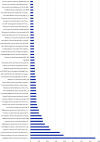Prediction of the Fatal Acute Complications of Myocardial Infarction via Machine Learning Algorithms
- PMID: 38680646
- PMCID: PMC11053239
- DOI: 10.18502/jthc.v18i4.14827
Prediction of the Fatal Acute Complications of Myocardial Infarction via Machine Learning Algorithms
Abstract
Background: Myocardial infarction (MI) is a major cause of death, particularly during the first year. The avoidance of potentially fatal outcomes requires expeditious preventative steps. Machine learning (ML) is a subfield of artificial intelligence science that detects the underlying patterns of available big data for modeling them. This study aimed to establish an ML model with numerous features to predict the fatal complications of MI during the first 72 hours of hospital admission.
Methods: We applied an MI complications database that contains the demographic and clinical records of patients during the 3 days of admission based on 2 output classes: dead due to the known complications of MI and alive. We utilized the recursive feature elimination (RFE) method to apply feature selection. Thus, after applying this method, we reduced the number of features to 50. The performance of 4 common ML classifier algorithms, namely logistic regression, support vector machine, random forest, and extreme gradient boosting (XGBoost), was evaluated using 8 classification metrics (sensitivity, specificity, precision, false-positive rate, false-negative rate, accuracy, F1-score, and AUC).
Results: In this study of 1699 patients with confirmed MI, 15.94% experienced fatal complications, and the rest remained alive. The XGBoost model achieved more desirable results based on the accuracy and F1-score metrics and distinguished patients with fatal complications from surviving ones (AUC=78.65%, sensitivity=94.35%, accuracy=91.47%, and F1-score=95.14%). Cardiogenic shock was the most significant feature influencing the prediction of the XGBoost algorithm.
Conclusion: XGBoost algorithms can be a promising model for predicting fatal complications following MI.
Keywords: Artificial intelligence; Machine learning; Mortality; Myocardial infarction; Prognosis.
Copyright© 2023 Tehran University of Medical Sciences. Published by Tehran University of Medical Sciences.
Figures
References
-
- Reeder GS. Identification and treatment of complications of myocardial infarction. Mayo Clin Proc. 1995;70:880–884. - PubMed
-
- Virani SS, Alonso A, Aparicio HJ, Benjamin EJ, Bittencourt MS, Callaway CW, Carson AP, Chamberlain AM, Cheng S, Delling FN, Elkind MSV, Evenson KR, Ferguson JF, Gupta DK, Khan SS, Kissela BM, Knutson KL, Lee CD, Lewis TT, Liu J, Loop MS, Lutsey PL, Ma J, Mackey J, Martin SS, Matchar DB, Mussolino ME, Navaneethan SD, Perak AM, Roth GA, Samad Z, Satou GM, Schroeder EB, Shah SH, Shay CM, Stokes A, VanWagner LB, Wang NY, Tsao CW, American Heart Association Council on Epidemiology and Prevention Statistics Committee and Stroke Statistics Subcommittee . Heart Disease and Stroke Statistics-2021 Update: A Report From the American Heart Association. Circulation 2021;143:e254–e743. - PubMed
-
- Kutty RS, Jones N, Moorjani N. Mechanical complications of acute myocardial infarction. Cardiol Clin 2013;31:519–531, vii–viii. - PubMed
-
- Montrief T, Davis WT, Koyfman A, Long B. Mechanical, inflammatory, and embolic complications of myocardial infarction: An emergency medicine review. Am J Emerg Med 2019;37:1175–1183. - PubMed
LinkOut - more resources
Full Text Sources


